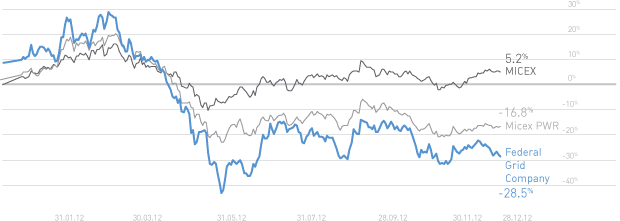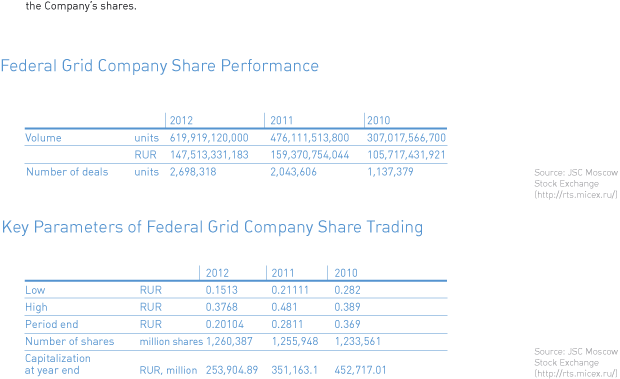- Federal Grid Company – Ten-year results
- Operations overview
- Social responsibility and sustainable development
- Financial performance overview
- Corporate governance report
- Share capital
-
APPENDICES
- Information on compliance with the FCSM corporate code of conduct
- Implementation of the assignments of the president and the government of the Russian Federation
- Information on transactions performed by JSC Federal Grid Company in 2012, recognized by russian federation laws as interested party transactions, and which are subject to the approval of the company’s authorized management body
- Audit Commission Conclusion on the Audit of Operational and Financial Activities of Federal Grid Company for 2012
- 2013 investor calendar
2012 Share Performance
Global equity markets closed higher in 2012, with MSCI World, a developed market index, up 13.2% and MSCI EM, which looks at emerging economies, gaining 15.1%. The key upside market factor was that the world's largest Central Banks adopted an active policy, aimed at stimulating the global economy. In particular, the ECB and the People's Bank of China cut interest rates, the U.S. Federal Reserve launched a new quantitative easing program, the ECB announced the unlimited redemption of Euro-zone countries’ government bonds, and the Central Banks of England and Japan expanded their asset re-purchase programs.
Resolving the Greek problem has also positively influenced market dynamics - the second tranche of aid to Greece and domestic government reforms removed the threat of Greece being removed from the Euro-zone, the consequences of which experts compared to the Lehman Brothers’ collapse that triggered the previous global financial crisis.
The Russian market grew 5.2% on the basis of the MICEX index, which is far below the growth rate of the MSCI World and MSCI EM indices. The market faced pressure from weak oil prices which at year end rose 3.5%, as well as from the deterioration of Russian economic prospects.
Electricity sector equities were major under-performers; the 2012 MicexPWR industry index decreased 16.8%. The indicator’s decline, which was large compared with the market, was due to continued regulatory pressure and uncertain prospects within the sector.
Electricity sector, Federal Grid Company’s shares

Federal Grid Company’s share prices were subject to fluctuations during the year due to continued regulator uncertainty and the year ended with a substantial decline in the share price, 28.5%. In the beginning of the year, the Company’s stock dynamics looked much better than the MICEXPWR index, as the Company showed a strong trend with financial indicators, as well as due to the fact that its share in final energy tariffs was minimal. Negative dynamics in April-May 2012 were the result of news flow on the establishment of the National Electrical Grid Company and the participation of Rosneftegaz in unifying grid assets, as well as the decision to place the Company in the list of strategic companies.
Further volatile dynamics for the Company’s stock price could be attributed to reduced risks of grid company consolidation on the basis of Rosneftegaz and continued uncertainty surrounding the final scenario for the merger between Federal Grid Company and IDGC Holding till mid-November, when the Russian President signed an order to establish JSC Russian Grids, which resulted in a partial recovery of the Company’s stock quotation. In late December, the discussion of delay in privatization process affected quotation of the Company’s shares.
As of 28 December 2012, Federal Grid Company’s share price on the Stock Exchange stood at RUR0.20104, which is 19% below analyst consensus, pointing to further upside potential for the Company’s shares.
Federal Grid Company Share Performance

Detailed information on trading in the Company’s shares and depository receipts is available on its web site in Investors / Share Information / Performance Chart .

 square km
square km